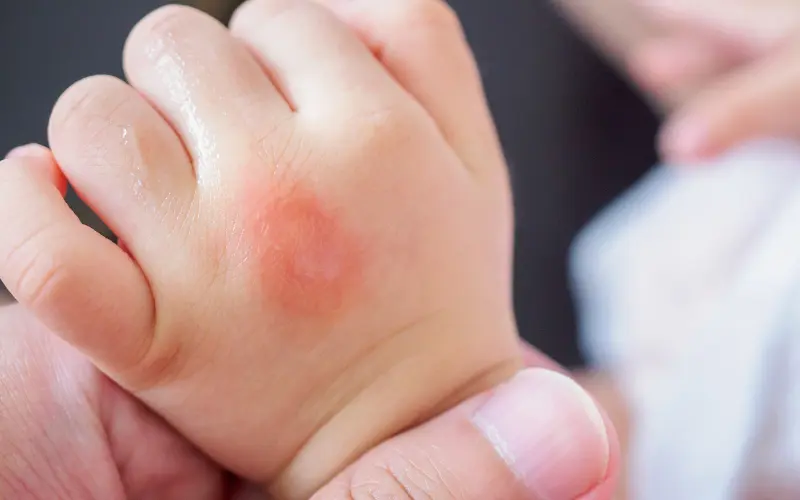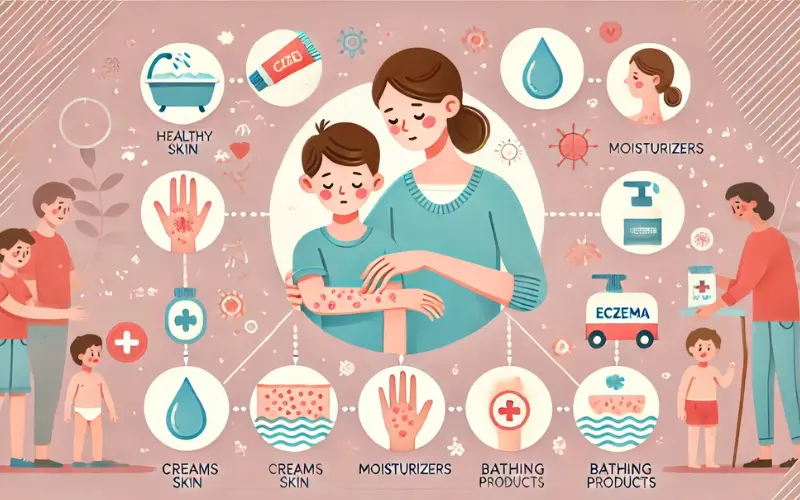Table of Contents
Treat Control Eczema Rashes Children
Eczema is a common skin condition affecting many children, causing discomfort, irritation, and persistent dryness. Managing and treating eczema requires a well-planned skincare routine, attention to triggers, and the use of gentle, non-irritating products. In this article, we’ll explore effective ways to treat and manage eczema rashes in children, helping you provide long-term relief for your little one. We will also introduce recommended products from our store E Baby Mart that can assist in keeping your child’s sensitive skin healthy and rash-free. Knowing how to treat eczema in babies can make a world of difference for parents.
For more detailed insights and expert guidance on managing eczema in children, visit the Children’s Hospital of Philadelphia’s resource on Atopic Dermatitis (Eczema). This page covers symptoms, diagnosis, and effective treatment options that can help parents navigate this common skin condition.
One of the most important steps in managing your child’s skin health, especially if they suffer from eczema, is ensuring that their diaper area remains clean and free of irritation. Diaper rashes and skin irritation can worsen the symptoms of eczema, making your little one even more uncomfortable. To prevent this, it’s crucial to follow proper diaper-changing routines, use barrier creams, and keep the skin dry. For more detailed tips and effective ways to protect your child’s delicate skin, check out our comprehensive guide on How to Prevent Diaper Rashes and Skin Irritation
Managing Eczema and Sensitive Skin in Babies

Eczema, often referred to as atopic dermatitis, frequently begins in infancy and can affect babies with particularly sensitive skin. Managing this skin condition involves creating a protective barrier against external irritants while providing ample moisture to the skin. The first step in managing eczema in babies is understanding that their skin is more vulnerable to external factors such as dry air, synthetic fabrics, and harsh soaps.
Parents need to adopt a proactive approach to managing eczema and sensitive skin in babies by incorporating the following measures into their daily routine:
- Gentle, lukewarm baths: Hot water can strip the skin of natural oils, exacerbating eczema. Keep bath time short (around 5-10 minutes) and always use lukewarm water.
- Pat the skin dry gently: After the bath, gently pat (do not rub) your baby’s skin dry with a soft towel to prevent irritation. Moisturize immediately afterward.
- Choose soft, natural fabrics: Clothing made from cotton or bamboo is breathable and less likely to irritate sensitive skin. Avoid wool or synthetic fibers, which can trap heat and moisture, causing itching.
In addition to these steps, using a specialized product like Eczema Relief Cream from our store E Baby Mart can help soothe and protect your baby’s delicate skin. These creams are formulated to hydrate deeply and maintain the skin’s moisture barrier, which is crucial for managing eczema.
How to Treat Eczema in Babies

Treating eczema in babies goes beyond skincare. It involves recognizing triggers, establishing a proper moisturizing routine, and ensuring that flare-ups are treated promptly to avoid infections. For parents, it can be overwhelming to watch their child suffer from itchiness and discomfort, but understanding how to treat eczema in babies can provide comfort and control over the situation.
The key steps to treating baby eczema are:
- Moisturize consistently: Moisturizing is the cornerstone of eczema care. Apply a thick, emollient-rich cream or ointment like the Gentle Baby Eczema Lotion multiple times daily, especially after baths.
- Use mild, fragrance-free cleansers: Opt for cleansers that are hypoallergenic and formulated specifically for eczema-prone skin. Soaps and shampoos with added fragrances or harsh chemicals can worsen eczema.
- Topical treatments: For more severe cases, pediatricians often recommend mild steroid creams or non-steroid alternatives to reduce inflammation and itching. It’s important to consult a doctor for the correct dosage and type of treatment.
Other essential tips include:
- Avoiding allergens: Common allergens such as pollen, pet dander, and certain foods can trigger eczema flare-ups. If you notice a pattern, eliminate the suspected allergen and observe the changes in your child’s skin condition.
- Humidify your home: Dry air, especially during winter months, can dry out your baby’s skin. A humidifier adds moisture to the air, helping keep your child’s skin hydrated.
Managing eczema rashes in children can be particularly challenging when paired with common sleep disruptions that many newborns face. Conditions like skin irritation often aggravate during the night, making it difficult for your child to rest peacefully. To help your baby sleep better through the night, addressing both the eczema flare-ups and sleep difficulties is essential. You can read more about the Common Newborn Sleep Challenges and How to Overcome them to ensure your child gets the rest they need, which is crucial for their overall comfort and health.
Baby Eczema: Causes & Treatment

Eczema can be a frustrating condition for both babies and parents. Knowing the causes of baby eczema can help you manage and prevent future flare-ups. Eczema is believed to be caused by a combination of genetic and environmental factors. Babies who have a family history of eczema, asthma, or hay fever are more likely to develop this skin condition. Additionally, environmental triggers such as low humidity, heat, certain fabrics, and even stress can cause flare-ups.
There are several common triggers that contribute to eczema, including:
- Harsh soaps and detergents: Products that contain strong fragrances or chemicals can strip away the skin’s natural oils.
- Changes in weather: Cold, dry weather or excessive heat and sweating can exacerbate eczema symptoms.
- Allergens: Dust mites, pet dander, and pollen are common household allergens that can trigger eczema.
Treating eczema effectively involves addressing these triggers and implementing a routine that soothes and strengthens the skin. Here’s what you can do:
- Identify and avoid triggers: Monitor your baby’s exposure to potential allergens and avoid known irritants. For example, washing your baby’s clothes with a mild, fragrance-free detergent can minimize skin irritation.
- Use appropriate skincare products: The Soothing Baby Body Wash from our store E Baby Mart is ideal for gently cleansing the skin without causing further irritation. This product is designed to protect your baby’s skin while providing essential hydration.
- Apply emollients regularly: Emollients help to lock in moisture and form a protective barrier over the skin. Apply liberally throughout the day, especially after exposure to water.
Moisturizing: The Key to Eczema Control

When it comes to managing eczema, moisture is your baby’s best defense. One of the most important steps in treating eczema is keeping the skin well-hydrated. Moisturized skin is less prone to drying out and developing cracks, which can lead to infections. Choosing the right type of moisturizer can significantly improve your baby’s skin health.
There are three main types of moisturizers used for treating eczema:
- Ointments: Thick and greasy, ointments are often the most effective at locking in moisture. They work well for severe eczema but may be too heavy for daytime use.
- Creams: Lighter than ointments but still effective, creams like our Eczema Soothing Moisturizer are a great option for daily application. They absorb quickly and can be applied more frequently.
- Lotions: Lotions are the lightest form of moisturizer and are good for mild eczema or maintenance in hot weather. However, they may not be moisturizing enough for severe eczema flare-ups.
While managing eczema, it’s important to also consider your child’s sleeping environment, as certain factors can worsen skin conditions. For parents who practice co-sleeping, it’s crucial to be aware of potential risks that could affect your child’s overall well-being. To learn more about the safety concerns and considerations, check out our article on The Truth About the Risks of Co-Sleeping where we dive into the potential impacts of co-sleeping on infant health, sleep quality, and more.
Dietary Considerations and Eczema
While skincare is crucial in managing eczema, diet can also play an important role. Some babies with eczema may have food sensitivities or allergies that can trigger or worsen flare-ups. Although food allergies do not cause eczema, they can aggravate the condition.
Here are some steps you can take to manage potential dietary triggers:
- Introduce new foods gradually: When starting solids, introduce one new food at a time. This makes it easier to identify any possible allergic reactions.
- Consider common allergens: Common food allergens such as dairy, eggs, soy, and wheat can sometimes exacerbate eczema. If you suspect that a food is worsening your child’s eczema, consult your pediatrician or an allergist for further guidance.
Keeping a food diary can help you track any correlation between your baby’s diet and eczema flare-ups.
Preventing Eczema Infections

Eczema compromises the skin’s natural barrier, making it more susceptible to bacterial infections. In some cases, scratching due to itchiness can lead to open sores that become infected. To prevent infection, it’s important to minimize scratching and protect the skin.
Here’s how you can prevent infections:
- Trim your baby’s nails regularly to avoid them breaking the skin while scratching. If necessary, consider using baby mittens at night.
- Apply an antiseptic cream if you notice any signs of infection, such as swelling, redness, or pus.
- Keep the skin moisturized: Dry skin is more likely to crack and become infected. By keeping the skin hydrated, you’re lessening the chance of infection.
When managing eczema rashes in children, maintaining soft and healthy skin is crucial to reducing irritation and flare-ups. A consistent skincare routine, using gentle products designed for sensitive skin, can make a significant difference. For more detailed tips on keeping your child’s skin healthy and hydrated, check out our comprehensive guide on Baby Skin Care 101: Essential Tips for Soft and Healthy Skin which provides expert advice on choosing the right moisturizers, cleansers, and techniques to help protect delicate skin.
Consulting a Pediatrician

If you notice that your baby’s eczema is not responding to over-the-counter treatments, it’s essential to consult a pediatrician. Severe cases of eczema may require prescription-strength treatments or additional testing to identify underlying causes.
Your doctor may recommend:
- Topical corticosteroids to reduce inflammation and itching.
- Oral medications for managing severe flare-ups.
- Allergy testing if your baby’s eczema seems to be related to certain foods or environmental allergens.
Early intervention and guidance from a healthcare professional can help manage the condition and provide your baby with the comfort they need.
Conclusion
Eczema rashes in children can be challenging to manage, but with the right approach, relief is possible. By understanding how to treat eczema in babies and implementing an effective skincare routine, you can help your child feel more comfortable and reduce the frequency of flare-ups. Consistency in care is key, and using products designed for sensitive skin can go a long way in soothing and protecting your baby’s skin.
Don’t forget to explore products like our Eczema Relief Cream, Gentle Baby Eczema Lotion, and Soothing Baby Body Wash to support your baby’s eczema treatment journey. With the right care, managing eczema and sensitive skin in babies can become a part of your daily routine, ensuring that your baby stays happy and rash-free
Dealing with eczema rashes in children can be challenging, especially when flare-ups disrupt their sleep routine. Establishing a consistent bedtime routine can be crucial for children with sensitive skin. If your baby is struggling to sleep due to eczema discomfort, you might also want to explore How to Sleep Train Baby: Finding the Right Approach for You to create a calming and effective sleep schedule. Finding the right approach that works for both you and your baby can make a significant difference in improving their overall sleep quality, even during those tough eczema nights.

